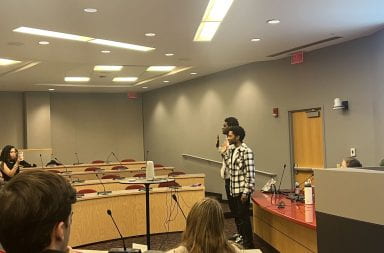
Eight resolutions were proposed by Undergraduate Student Government’s general assembly Nov. 29. Credit: Teresa Cardenas | Lantern Reporter
After a slow start to the semester, eight resolutions were proposed by Undergraduate Student Government’s general assembly Nov. 29. During its final meeting of the semester, seven resolutions passed and one was tabled, allowing for it to be voted on at a later date.
The general assembly passed resolutions in support of bringing a location to campus, specific to fixing and selling bicycles, as well as a resolution in support of creating a university-wide lockdown procedure.
Two resolutions were also passed in support for changes to end-of-semester professor and course evaluations. The resolution that was tabled sought support of new general education requirements originally proposed in a University Senate meeting.
The three resolutions that produced the most discussion — all of which passed — addressed opposing the recent suspension of fraternity activity, banning plastic water bottle sales on campus and supporting Ohio State’s divestment from top-200 fossil fuel companies.
“Fraternities, who have had good records for years, have been forced to cancel events that cost thousands of dollars and a lot of time,” said Imani Davis, co-sponsor of the resolution that opposes the IFC ban, and fourth-year in film studies and theater. “This kind of blanket punishment is unacceptable as the majority of the chapters affected have done absolutely nothing wrong.”
The suspension by Ohio State came after 11 of the 37 Interfraternity Council chapters were under investigation for violations of the code of student conduct. The resolution called to oppose the suspension and to support any future actions taken by IFC that ensure the reinstatement of fraternal recruiting activities by the beginning of Spring Semester.
That time of the year is crucial for recruiting, said co-sponsor Caitlin Cromes, USG education and human ecology senator. She said without spring recruitment, some fraternities might end because they would not have a large enough membership — each fraternity member pays chapter-specific dues — to support functioning costs.
Davis, a fourth-year in film studies and Cromes, a fourth-year in fashion and retail studies, are involved in Greek life as they are each members of sororities, according to their social media pages.
Opposing USG members asked why IFC is relevant to the general assembly and the negative implications that come with opposing the ban. One concern of USG’s natural and mathematical sciences senator, Halima Mohamed, a fourth-year in biology, was the perception that could come with the organization supporting fraternities who have committed wrongdoings.
“We completely understand the need for investigation and disciplinary action for those who have not held up their values of the university or national organizations,” Davis said. “But [what] we do not, and will not, understand is the need for generalized punishment on those who have done nothing to afflict their community.”
The resolution calling for the end of sales of all plastic water bottles on campus was put forth to eliminate waste on campus. Beyond the sustainability aspect, senators questioned the impact of ridding campus of disposable water bottles.
USG public affairs senator Julia Dennen, a second-year in public management, leadership and policy, said it would be unfair to students who needed water throughout the day, but forgot to bring a reusable water bottle.
“I understand that this is really good for the environment and for the goal of making a zero-waste campus, but it’s also going to hinder students and their everyday experiences,” Dennen said.
Other senators discussed how it would affect students with on-campus dining plans and the cost of switching from multiple plastic water bottles to one reusable water bottle.
The resolution passed by a narrow vote, 22-17, with five abstentions.
The final resolution of the night called for the removal of Ohio State investments in some of the top-200 carbon-emitting companies and two other companies — Energy Transfer Partners and Duke Energy — due to the companies’ connections with the fossil fuel industry. It is not clear the extent to which Ohio State invests in the companies.
The resolution was proposed by Renew, a student organization focused on creating a “sustainable campus by removing university investments from dirty energy,” according to its website. The goal of the resolution would be to stop the effects of climate change.
“We want the university to stop being complicit in the destruction of our environment,” said Renew member Benjamin Allen, a second-year in Arabic and linguistics.
The questions that countered this resolution came from USG food, agricultural and environmental sciences senator Nick Davis and Max Littman, who was stepping in for USG north campus senator Ben Kanas.
Davis and Littman, a fourth-year in natural resources management and a second-year in political science, respectively, said it would be wrong to force Ohio State to spend its money in specific ways. Another point of concern for Davis was its political content and how passing the resolution would be a “political statement” from USG, which is said to be a nonpartisan organization.
Renew member Tal Shutkin said whether the assembly votes for or against this resolution, it would be seen as a “political action.”
“This is political one way or the other,” said Shutkin, a third-year in geography and environmental policy and decision-making. “It’s not only political; it’s a practical thing that we can be doing as students and as young people who can actually make a difference in climate change.”
The resolution was passed with two votes against.


